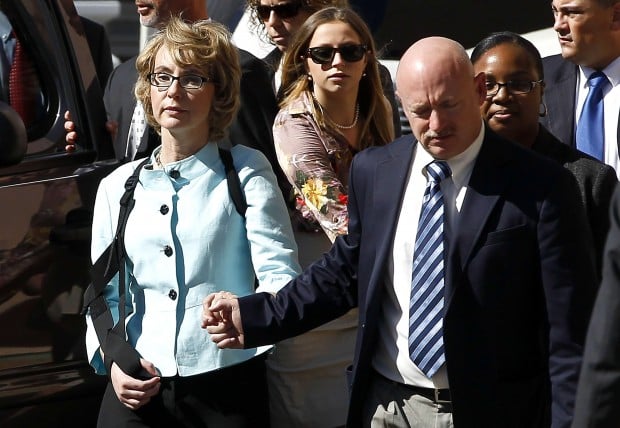Gabrielle Giffords limped slowly to the podium in the large federal courtroom, wearing an arm brace and led by her husband, Mark Kelly.
Then she turned, and for the first time faced the man who tried to kill her on Jan. 8, 2011. Standing quietly against the podium, supported by Kelly as he spoke, she embodied a fact that Jared Lee Loughner took months to comprehend: She survived.
"Mr. Loughner," Kelly said, looking straight at the gunman, "you may have put a bullet through her head, but you haven't put a dent in her spirit and her commitment to make the world a better place."
"Gabby struggles to walk. Her right arm is paralyzed. She is partially blind. Gabby works harder in one minute of an hour - fighting to make each individual moment count for something - than most of us work in an entire day."
Giffords did not speak.
Soon after, U.S. District Judge Larry A. Burns sentenced Loughner to seven consecutive life terms in prison, plus 140 years for the mass shooting last year.
Afterward, Pima County Attorney Barbara LaWall announced she would not pursue a case under state law against Loughner. That means Thursday's sentencing concluded all criminal proceedings against him.
The end of the criminal case meant the families of the six people he killed that day, the 13 he wounded and those harmed simply by being there can leave the legal process behind.
But many said they are permanently wounded by those few seconds when Loughner opened fire at then-U.S. Rep. Giffords' Congress on Your Corner event outside a northwest-side Safeway.
Burns acknowledged that a person can't serve seven life terms in a row, but he said the sentence is meaningful.
"The consecutive-sentence nature of the life sentences, I think, reflects the individuality of the victims who lost their lives here. Each of those victims was important and made wonderful contributions," he said.
One of the life sentences is for the attempted assassination of Giffords.
The others were for the murders of Christina-Taylor Green, 9; Dorothy "Dot" Morris, 76; U.S. District Judge John Roll, 63; Phyllis Schneck, 79; Dorwan Stoddard, 76; and Gabriel "Gabe" Zimmerman, 30.
Burns also suggested what the sentence could mean for the surviving victims and the family members of those who died.
"What you get today is resolution - resolution that I hope at some point will give all of you a chance to have peace in your lives," he said.
It is a sentiment echoed by several of the 10 survivors who spoke at the hearing, including former Giffords staff member Pam Simon, who was shot twice.
"With the sentencing of Jared Loughner, a chapter will close, but the book will remain open for each of us," Simon said.
Severe mental illness
Loughner's severe mental illness, schizophrenia, loomed over the sentencing, softening the anger of some victims and coloring the sentence imposed.
His prison psychologist, Christina Pietz, testified that Loughner has continued to improve even since August, when he was deemed competent to plead guilty. At Thursday's hearing, Loughner declined to make a statement on his own behalf, but he appeared to be looking directly at the victims who turned and spoke to him.
After each victim spoke, Loughner's attorney, Judy Clarke, spoke briefly to him. He usually nodded in reply.
Loughner was pale, wearing khaki pants, a dark shirt and dark tie. The only words he spoke were when Burns asked if he was sure he didn't want to talk.
"Yes, sure," he said.
His evident improvement had an ironically disturbing meaning that several victims noted: The whole thing could have been avoided if someone had sought treatment for him earlier.
Victim Randy Gardner, who spent decades as a therapist in Oregon, noted that Loughner was ordered but never physically forced to take medication while in prison last year. When told he had to take psychotropic drugs, he grudgingly took them orally. Many severely mentally ill people don't respond that well.
"He was treatable," Gardner said after the hearing. "This is tragic."
Talking to Loughner, Simon said: "You remind us of the failure of our society to provide adequate mental-health care. You remind us that too often we simply look away."
Each time victims, attorneys and the judge discussed the missed opportunity, Loughner's mother, Amy sobbed in the front row behind the defense table, where his father, Randy, also sat.
avoided death penalty
If he weren't mentally ill, Loughner might still be facing a trial and potential death penalty, as Assistant U.S. Attorney Wallace Kleindienst made clear.
"You have been given a gift, whether you know it or not," Kleindienst said. "Almost all the victims you shot, and the family members of those you killed, came to us and said the death penalty is not something they wanted us to seek in this case."
"They recognized you were a man with a mental illness that, although it didn't justify what you did, it explained what you did," he said.
While sentencing Loughner, Burns emphasized that his mental illness did not mean he could have successfully pursued an insanity defense. Prosecutors had too much evidence that his conduct was "purposeful" and that he appreciated his actions were wrong.
"It would not have washed," Burns said.
Barber, others satisfied
U.S. Rep. Ron Barber, who was elected to Giffords' seat in Congress after her injuries caused her to step down, and other victims said they were satisfied with the outcome of Loughner's case.
"I am grateful that all of us will be spared the painful ordeal of a lengthy legal process followed by unending appeals," said Barber, who was shot twice and disabled by Loughner.
He told Loughner's parents he holds no animosity toward them, and told Loughner he has no hatred for him, adding, "but I am very angry and sick at heart about what you have done and the hurt you have caused to all of us."
In their statements, Burns and Kelly dove straight into the politically charged topic of gun laws. Kelly chastised Gov. Jan Brewer by name, for dismissing concerns about high-capacity magazines just a week after Loughner's mass shooting, but she wasn't the only target.
"We have a political class that is afraid to do something as simple as have a meaningful debate about our gun laws and how they are being enforced," Kelly said.
"We have representatives who look at gun violence not as a problem to solve, but as the white elephant in the room to ignore. As a nation we have repeatedly passed up the opportunity to address this issue. After Columbine, after Virginia Tech, after Tucson and after Aurora we have done nothing."
Burns pointed out that selling high-capacity magazines was prohibited before the assault-weapons ban expired in 2004. Loughner used such a magazine to open fire at Giffords' event.
"I don't understand the social utility of allowing the public to have magazines with 30 bullets," the judge said, asking that the country "balance the social utility of having those things against the harm caused in this case."
Other victims noted that they have joined Mayors Against Illegal Guns, a group working to ensure that the background-check system for gun purchases be improved. But more than that, the victims revealed the pain Loughner caused and their desire that he recognize daily what he has done.
Patricia Maisch, who took Loughner's gun clip away from him when he tried to reload during the shooting, asked that he be kept in good enough mental health that he can comprehend his actions. Burns cited that concern in ordering Loughner back to the U.S. Medical Center for Federal Prisoners in Springfield, Mo., though the U.S. Bureau of Prisons may choose to move him.
Most of all, the victims spoke of their desire to move forward.
"You have decades upon decades to contemplate what you did," Kelly said. "But after today, after this moment, here and now, Gabby and I are done thinking about you."
On StarNet: See more photos of the sentencing at azstarnet.com/gallery
Ron Barber: "It's a sad commentary that the only way he gets treatment is by killing six people." / Page A5
Other victims: Survivors of Tucson's Jan. 8, 2011, mass shooting address the killer in court / Page A8
Contact reporter Tim Steller at tsteller@azstarnet.com or 807-8427.





